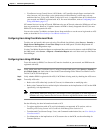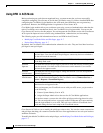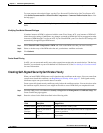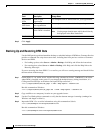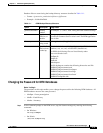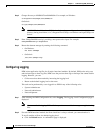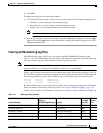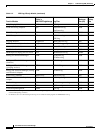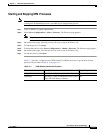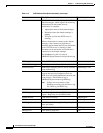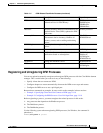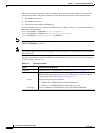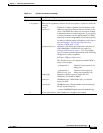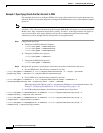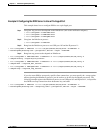
11-19
User Guide for Device Fault Manager
OL-11390-01
Chapter 11 Administering DFM (Advanced)
System Administration
Example 2: Configuring the DFM Server to Use a Privileged Port
This example shows how to configure DFM to use a privileged port.
Step 1 Unregister any processes that depend on the DfmServer (such as the notification adapters).
#
NMSROOT
/bin/pdcmd -u DfmFileNotifier
#
NMSROOT
/bin/pdcmd -u DfmMailNotifier
#
NMSROOT
/bin/pdcmd -u DfmTrapNotifier
Step 2 Unregister the DfmServer process:
#
NMSROOT
/bin/pdcmd -u DfmServer
Step 3 Reregister the DfmServer process to use UDP port 162 and the IP protocol 1:
#
NMSROOT
/bin/pdcmd -r DfmServer -e
NMSROOT
/objects/smarts/bin/sm_server -d DfmBroker -f
"--bootstrap=DFM_bootstrap.conf --privopen=IP:1,UDP:162 --output --name=DFM"
Step 4 Reregister any processes that depend on DfmServer:
#
NMSROOT
/bin/pdcmd -r DfmFileNotifier -d DfmServer -e
NMSROOT
/objects/smarts/bin/sm_notify -f
"--adapter=filelog --output=sm_file_notifier"
#
NMSROOT
/bin/pdcmd -r DfmMailNotifier -d DfmServer -e
NMSROOT
/objects/smarts/bin/sm_notify -f
"--adapter=mail --output=sm_mail_notifier"
#
NMSROOT
/bin/pdcmd -r DfmTrapNotifier -d DfmServer -e
NMSROOT
/objects/smarts/bin/sm_notify -f
"--adapter=trap --output=sm_trap_notifier"
If you also want DFM to accept only specific client connections, you must specify the --accept option
when registering the DfmServer process (you do not have to do this for the adapter processes). The
following example registers the DfmServer process to use UDP port 162 and IP protocol 1, and specifies
that DFM can accept connections from hostnames lucy and ethel:
#
NMSROOT
/bin/pdcmd -r DfmServer -e
NMSROOT
/objects/smarts/bin/sm_server -d DfmBroker -f
"--bootstrap=DFM_bootstrap.conf --accept=lucy,ethel --privopen=IP:1,UDP:162 --output --name=DFM"



